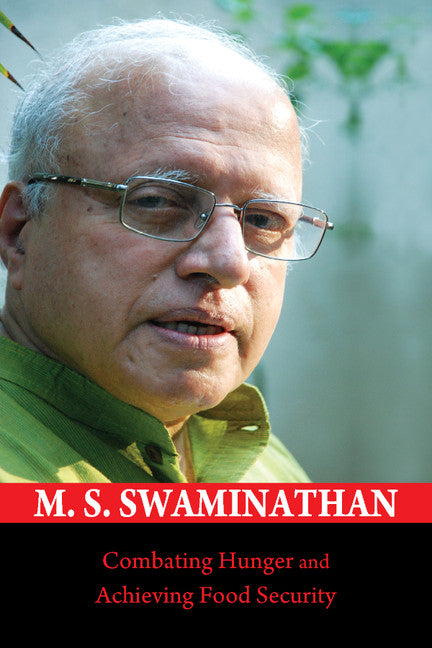Freshly Printed - allow 4 days lead
Couldn't load pickup availability
Combating Hunger and Achieving Food Security
This book provides a comprehensive discussion on the causes of hunger and resource management to achieve food security.
M. S. Swaminathan (Author)
9781107123113, Cambridge University Press
Hardback, published 8 January 2016
183 pages
23.6 x 16 x 1.6 cm, 0.42 kg
'One enjoys reading all the chapters of the book as it conveys in a lucid way important issues and policies in agriculture, hunger, food security and malnutrition. … Drawn from an experience of over seven decades, the book is a delight not only for the manner in which it condenses his wisdom, but for the style in which it is conveyed.' K. Subramanian, The Hindu (thehindu.com)
The issues that need to be addressed in combating hunger and achieving food security are highlighted in this book by a great Indian geneticist. It also discusses the major causes of chronic and hidden hunger and emphasises the need to redesign the farming system based on nutritional considerations. The role of an effective monsoon management programme to maximise its benefits is examined. There are chapters that analyse the importance of biodiversity conservation and enhancement and farmer skill development. Important issues to increase agricultural production including investment by financial institutions in agriculture and rural development, women's role in agriculture and youth employment in rural livelihoods are discussed in great detail in the text. The book concludes that there must be synergy between scientific knowledge, political will and farmers' active participation to achieve the goal of overcoming chronic and hidden hunger in the populations of developing countries.
Foreword
Preface
Acknowledgements
List of abbreviations
1. Genesis and growth of the yield revolution in wheat
2. Our agricultural heritage
3. Shaping our agricultural destiny
4. Thrust on farm revival
5. Nutri-farm movement
6. Nutrition-sensitive agriculture
7. Food losses and food waste
8. Rice in zero hunger challenge
9. Monsoon management
10. Importance of ecological conservation
11. Caring for ecology and heritage
12. Conserving biodiversity
13. Overcoming hidden hunger through aquaculture
14. Biofuels – the way to go
15. Food security
16. Vigilance for sustainable food security
17. Food security and social protection
18. Food security and its role
19. Sustaining the livestock revolution
20. Challenges in the year of science
21. Agriculture and humanism
22. Fostering the science of science communication
23. Olympic move for saving children
24. Youth: the agents of change
25. Role of women in agricultural production
26. Know-how to do-how
27. From Bengal famine to right to food
28. Financial institutions and fighting food inflation
29. Public good research in agriculture
30. The future of Indian agriculture
Bibliography.
Subject Areas: Environmentalist, conservationist & Green organizations [RNB], Environmentalist thought & ideology [RNA], The environment [RN], Earth sciences, geography, environment, planning [R]


